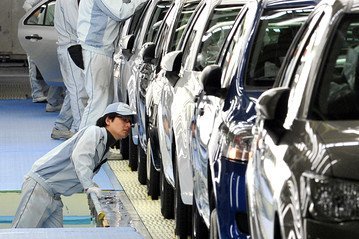Toyota Follows Tesla, Makes Hydrogen Patents Open Source

CEO Elon Musk said at the time that patents, "serve merely to stifle progress, entrench the positions of giant corporations and enrich those in the legal profession." Despite some disagreement on which gasoline alternative (electricity or hydrogen) will power the automotive future, it looks like the folks over at Toyota like the idea of making advanced technology easier for others to get their hands on.
Last summer, Tesla said that it would, "not initiate patent lawsuits against anyone who, in good faith, wants to use our technology." In an announcement today at CES, Toyota said it would let "automakers who will produce and sell fuel cell vehicles, as well as ... fuel cell parts suppliers and energy companies who establish and operate fueling stations" get free access to 5,680 fuel cell related patents around the world. That means if you're interested in building your own Mirai H2 car, you can now get some of the instructions. There's a catch, though, in that Toyota's H2 vehicle patents will only be free, "through the initial market introduction period, anticipated to last until 2020." Patents about making and selling hydrogen will be free "for an unlimited duration."
Toyota's Senior VP of Automotive Operations, Bob Carter, said that, "At Toyota, we believe that when good ideas are shared, great things can happen. ... By eliminating traditional corporate boundaries, we can speed the development of new technologies and move into the future of mobility more quickly, effectively and economically." Toyota generates a lot of patents each year – 1,491 in 2012 in the US alone, for example – but it did not see fit to make them all open to competitors.
While we don't know for sure how many automakers have decided to use Tesla's patents since they were made public, but it appears that interest in the technology is muted. We'll have to wait and see how the industry reacts to the influx of H2 information.


